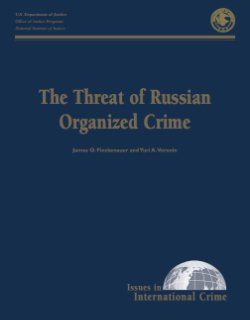The Threat of Russian Organized Crime
By James O. Finckenauer and Yuri A. Voronin
The general definition of "organized crime" used in this paper is "crime committed by criminal organizations whose existence has continuity over time and across crimes, and that use systematic violence and corruption to facilitate their criminal activities." The distinctiveness of Russian organized crime is the degree to which it is embedded in the post-Soviet political system. The transnational character of Russian organized crime, when combined with its high degree of sophistication and ruthlessness, has made it a global concern. In tracing the historical, political, and economic contextual features of Russian organized crime, this paper discusses actions by the Russian government since 1991 to cope with its crime problem. It also presents a case study of organized crime in the Urals region of Russia. The paper concludes with a discussion of the actual and potential impacts of Russian organized crime on the United States. The latter discussion notes that the greatest threat to the West, the United States in particular, comes from the expansion of Urals-based criminal activities abroad. It is estimated that some 12 to 15 loosely categorized criminal groups with international ties to Russia or other former Soviet republics are currently operating in the United States, having an estimated 500-600 members.
-
These varied criminal groups are extensively involved in a broad array of frauds and scams, including health care fraud, insurance scams, stock frauds, antiquities swindles, forgery, and fuel tax evasion schemes. Russians have become the principal ethnic group involved in credit-card fraud in the United States. The laundering of the huge profits of Russian organized crime abroad is increasing its penetration into legitimate sectors of the global economy, and Federal and regional governments do not have the resources to counter its money-based power and influence. Legitimate businesses, including the movie business and textile industry, have become targets of criminals from the former Soviet Union. Countering transnational organized crime networks will require a costly and lengthy international effort in which the United States must play a major role.
Washington, DC: U.S. Department of Justice Office of Justice Programs National Institute of Justice, 2001. 40p.


